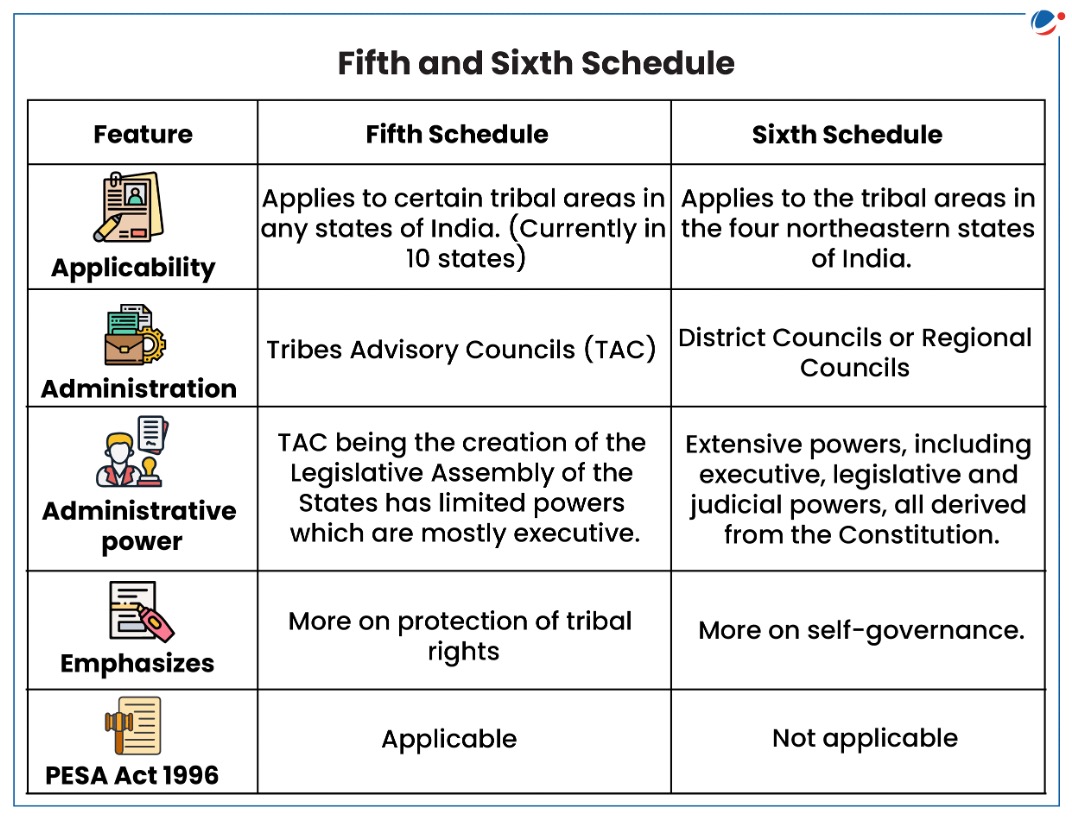Why in the news?
The people of Ladakh are protesting for Ladakh to be recognized as a tribal area under the Sixth Schedule.
More in News
- Ministry of Home Affairs argued that granting sixth schedule status to Ladakh necessitates a constitutional amendment, a complex process.
- During a meeting with Ladakh representatives, the union home minister proposed extending Article 371-like protections to the region.
Protection under Article 371
|
About Sixth Schedule
- The Sixth Schedule of the Constitution, under Article 244(2) and Article 275(1) of the Constitution, is provided for the administration of tribal areas in Assam, Meghalaya, Tripura, and Mizoram.
Provisions of the Sixth schedule
- It empowers the Governor to create Autonomous District Councils (ADCs) and Autonomous Regional Councils (ARCs) in these four states.
- Composition of ADCs: ADCs consist of not more than thirty members, out of which four are nominated by the Governor while the rest are elected. (Bodoland Territorial Council is an exception; it can have up to forty-six members)
- ARCs: If there are different Scheduled Tribes in an autonomous district, the Governor may divide the area or areas inhabited by them into autonomous regions.
- The sixth Schedule conferred the following Executive, Legislative and Judicial powers to ADCs and ARCs.
Power | Subject |
Legislative Power | To make rules
|
Executive Power |
|
Judicial Powers |
|
Financial Powers |
|

Benefits Ladakh will get if included in Sixth Schedule
- Address Local Issues: The ADCs could address issues specific to Ladakh, such as environmental protection, tourism management, and sustainable development practices.
- Land Rights: Ladakh enjoyed analogous autonomy as part of the erstwhile state of Jammu and Kashmir through Article 35A of the Indian Constitution till it was repealed in 2019.
- Hence, the Sixth Schedule would safeguard the land and forest rights of the tribal communities and protects them from alienation.
- Safeguards for Tradition: Ladakh's unique cultural heritage and traditional customs would be recognized and legally protected.
- Resource Management: The ADCs would have greater control over mineral resources within their jurisdiction, allowing them to manage them more effectively.
- Job Opportunities: There could be increased reservation in government jobs and educational institutions for people of Ladakh, promoting local employment.
Issues in awarding Sixth Schedule Status to Ladakh
- Financial Viability: Establishing and running Autonomous District Councils (ADCs) requires significant financial resources.
- Inter-Community Dynamics: Balancing the interests of the Buddhist majority in Leh and the Muslim majority in Kargil within the framework of the Sixth Schedule could be challenging.
- National Security Considerations: Ladakh's sensitive border location raises concerns that increased autonomy might complicate coordination with the central government on security matters.
Conclusion
Initiating a dialogue involving Ladakhi representatives, political leaders, and the central government is crucial. The key lies in finding a solution that respects Ladakh's unique identity and aspirations while considering the broader national framework. Open communication and a willingness to explore alternatives are essential for achieving a positive outcome






